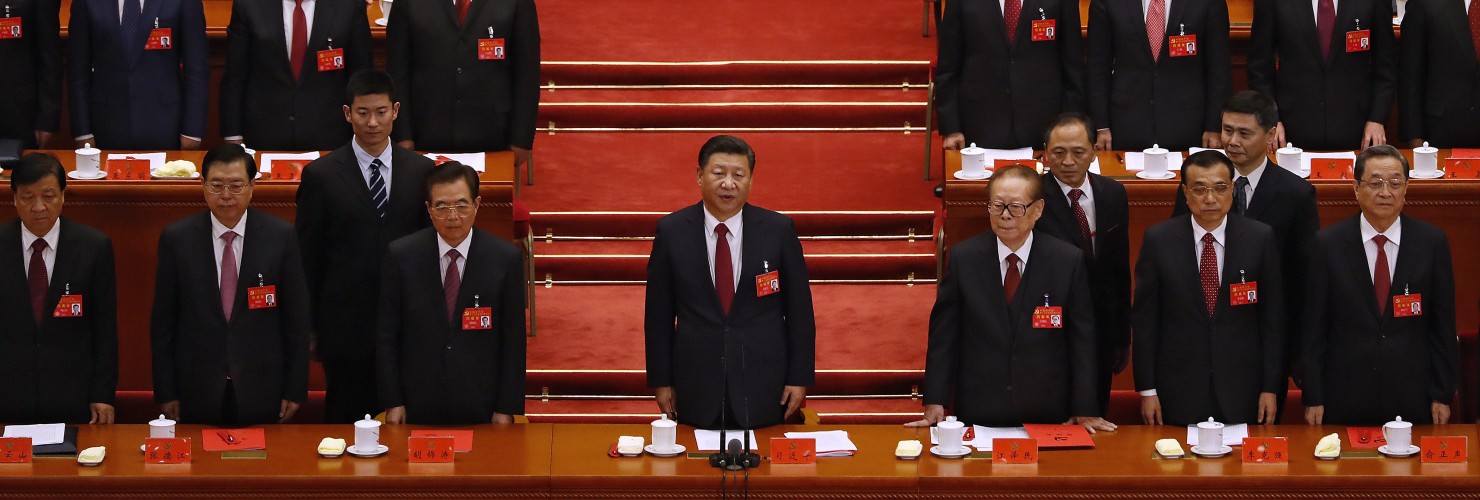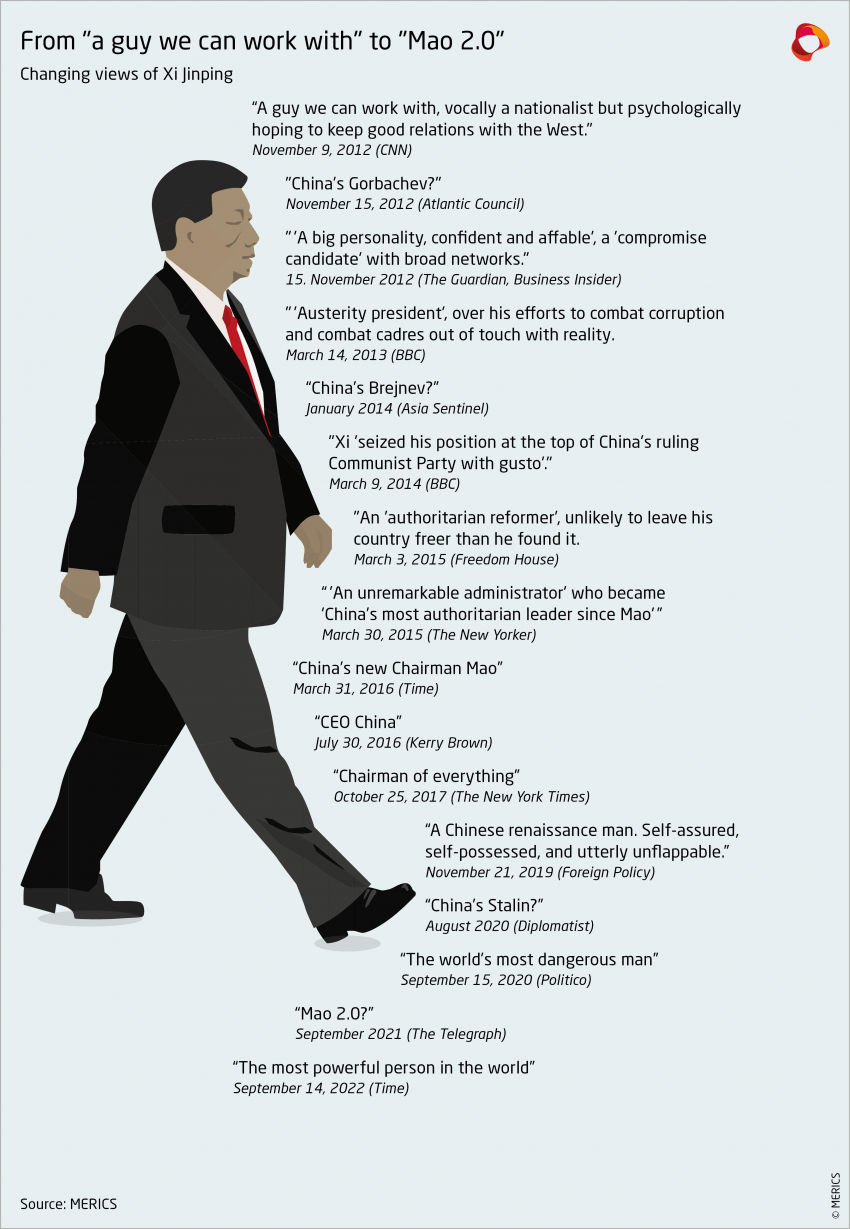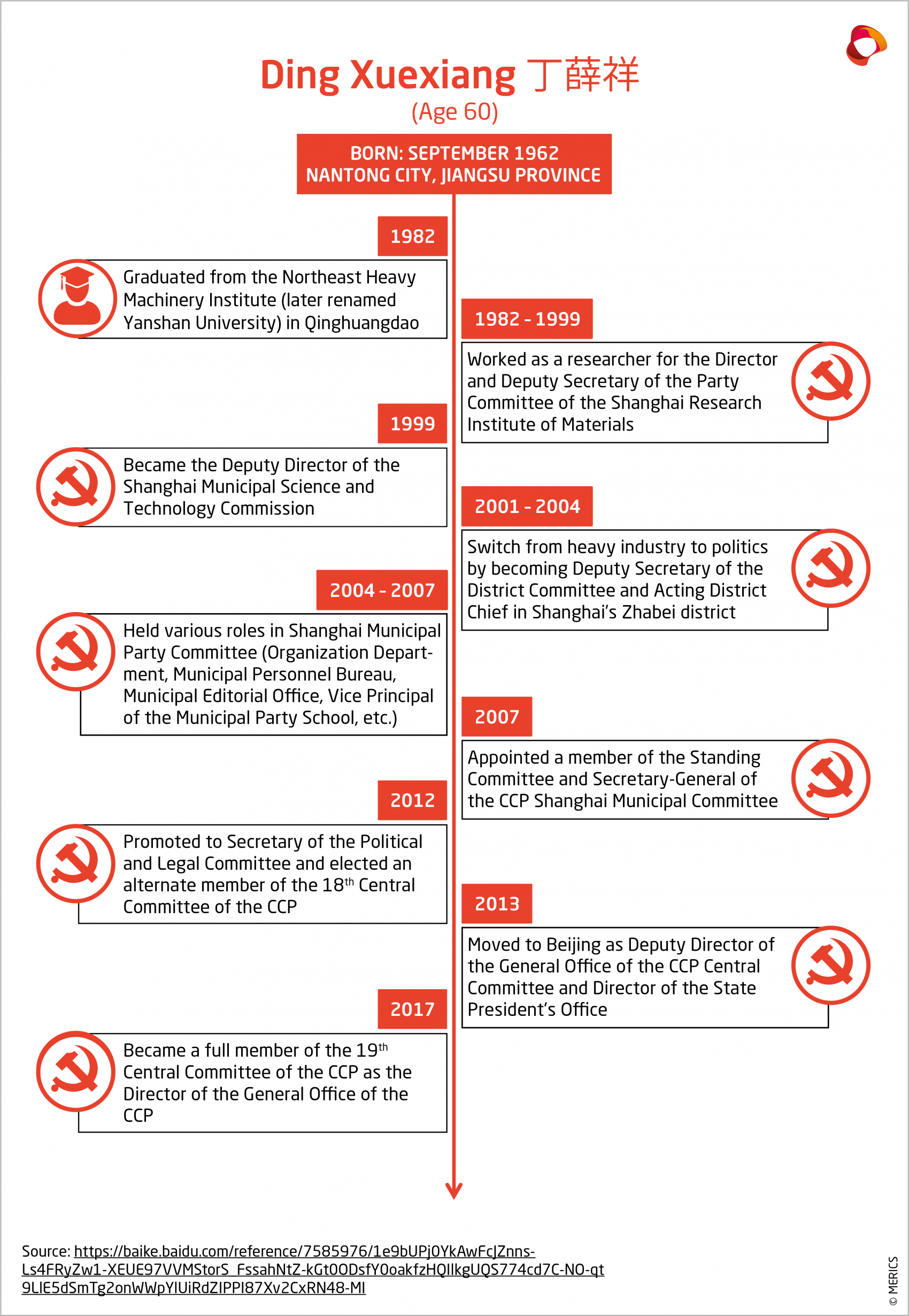

Preview: The 20th Party Congress
TOP STORY
Xi stands to replace two fifths of top leadership at five-yearly CCP Congress
Next to being installed as General Secretary for a historic third five-year term, Xi Jinping looks set to use the Chinese Communist Party’s National Congress, which starts on October 16, to install a string of younger loyalists in the Party’s two highest organs. If the rule of retiring at 68 still counts for all leaders in the 25-member Politburo and its currently seven-member Standing Committee except the General Secretary, Xi will be able to promote at least ten rising stars into the Politburo. Two of them can be elevated yet further into the Standing Committee.
The more fresh faces Xi can bring on board, the firmer his grip on the CCP will likely become – and the more ready he might be to begin signaling which of these cadres might succeed him, possibly as early as the next CCP Congress in 2027.
It is a sign of Xi’s power that predictions about the 20th five-yearly congress are harder than in recent memory. Speculation about which cadres will be elevated mid-October has been rife for months, but there is plenty of room for surprises. By aiming for a third term as General Secretary at the age of 69, Xi has rewritten the political rules of the last 20 years – or at least those relating to himself. But it is important to remember that at least the age-limit was established in 2002 to edge out certain members of the leadership.
The most enduring constant of CCP leadership transitions has always been personal power – and Xi surely has enough of that to reset the younger norms unchallenged and to define the next Politburo and its Standing Committee very much on his terms.
But Xi’s refreshed top team of (probably still seven) Standing Committee members, in particular, will not have time to rest on its laurels. “Common Prosperity” – the CCP’s quest to reduce income inequality and the social ills of unchecked growth – has been billed as the Congress’ theme, making it interesting to see how Xi will align the customarily celebratory language of his “work report” with warnings about “unseen challenges”.
That’s because China’s social and economic situation is bleak. Crisis mode has become the new normal and the lockdowns of Xi’s zero-covid policy have raised the pressure for more structural changes to social welfare and fiscal support for corporate and public coffers.
MERICS analysis: “Setting the tone for the next five years, Xi will use his opening speech to double down on his policy pillars of ideology-driven politics, more authority for the Party, and more international clout and self-reliance for China,” said Nis Grünberg, Lead Analyst at MERICS. “While the CCP’s National Congress will be a coronation ceremony for Xi and his ideology, the country faces the toughest challenges in decades. Although millions are in lockdown and socioeconomic issues are piling up, the party’s message will be one of triumph.”
METRIX
30 million
This is the number of people in China that will be locked down as Xi Jinping addresses the CCP’s National Congress. Based on official information about areas in lockdown, MERICS estimates that around 12 million people are under strict lockdown across China, while another 18 million are in semi-lockdown, with public gathering-places closed and regular testing mandated. Yet a change to the zero-Covid strategy is not on the horizon, as Xi fears that opening-up could quickly overwhelm the county’s healthcare system.
TOPICS: WHAT TO WATCH AT THE 20TH PARTY CONGRESS
Politics and society – heavy on anti-corruption, but light on women’s rights
With strict governance of the CCP a priority, Xi Jinping’s approach to members’ discipline is set to intensify at and after the congress. Beyond graft and financial misdeeds, the Party’s anti-corruption watchdog, the Central Committee for Discipline Inspection, is likely to see its authority and scope expanded further to target bureaucrats who disregard official lines set by the CCP.
The anti-corruption campaign which Xi initiated after coming to power in 2012 has been expansive and successful, not least at purging the party of “tigers and flies.” But it has also become a useful tool for Xi to control Party officials’ conduct by enforcing discipline and loyalty. Those who question his zero-Covid policy, for example, can be deemed “anti-establishment.”
Whether another woman will be promoted to the Politburo will provide a strong indication of where the party stands on women’s rights. 72-year-old Sun Chunlan is set to retire as the only female member of the CCP’s second most powerful body (after the Standing Committee).
Although there are no rules forcing the Party to do so, another woman is expected to take her place. But, even then, having only one female on the 25-strong Politburo would be little more than lip-service to women’s rights – especially in light of the spate of high-profile cases of harassment and violence against women.
Economics – securing the economy against risks both foreign and domestic
“Indigenous innovation” and “self-reliance” to counter foreign efforts to “contain” China will dominate Xi Jinping’s portrayal of China’s economic priorities at the CCP’s National Congress. After a decade in power, Xi is likely to hold course on his economic agenda, including a familiar laundry list of development aims.
But making the economy more secure in the face of foreign and domestic risks will take priority – as will advancing his economic ideology. “Xi Jinping Economic Thought” about China’s social and economic development came out in June and the congress is an ideal stage upon which to add details. Ideology is becoming more entrenched in economic policymaking – as the congress’ theme of “Common Prosperity” to counter inequality clearly demonstrates.
A deteriorating global economy may lend the congress greater urgency in advancing Xi’s “Dual Circulation Strategy” of replacing export-driven growth with (it is hoped more reliable) increasing domestic consumption.
The leadership may also signal its intent to reduce risks domestically, albeit with a poor track record – debt reduction went out the window amid calls for stimulus earlier this year. Other priorities will include the debt-burdened real estate market, about which Xi continues to spread his mantra that “homes are for living in, not speculation”, and financial markets, where efforts against the “disorderly expansion of capital” to ensure a “fair market-competition order” continue.
Foreign relations – Xi’s choice between an aggressive and a softer approach
Xi Jinping’s choice of words to describe the international situation – particularly regarding Ukraine and Taiwan – will signal how he plans to navigate a world in which states are again forming opposing blocs.
Xi will likely use his “Work Report” to lay greater emphasis either on altering the international order through bolder geopolitical competition with the US or on stabilizing international relations and protecting its economy. The former would reinforce a confrontational foreign policy under “Xi Jinping Thought on Diplomacy”. The latter would be a more defensive approach, likely emphasizing the need for resilient supply chains, diversified export markets and a less powerful USD, a sign of Beijing’s fears of becoming the target of Russia-style sanctions.
Regardless of Xi’s choice of emphasis, there will be changes in foreign policy leadership. The CCP’s top diplomat Yang Jiechi is expected to retire, having passed the threshold of 68. As Foreign Minister Wang Yi is already 69, the most likely successors include Xi-loyalist Song Tao, until recently director of the CCP’s International Liaison Department, and Liu Jieyi, director of the State Council's Taiwan Affairs Office and a former ambassador to the UN. Depending on his priorities, Xi can find a better candidate for expanding control over the foreign-policy apparatus with Song, or developing a more outward-looking, multilateral agenda with Liu.
Science and technology – defense-industry veterans set to climb the Party ladder
The “all-of-state effort” (举国体制) for technological self-reliance will feature prominently at the CCP’s National Congress. It will likely lead to the rare promotion of a defense-industry expert – not the usual ideologues and economists – to the Party’s top ranks. China Aerospace Science and Technology Corporation veteran Ma Xingrui, currently Xinjiang Party secretary, has a good chance to enter the Politburo. He will, however, compete with his former colleague Zhang Qingwei, currently Heilongjiang Party secretary, who is also a rising political star.
Pride in the China’s space missions has made the “aerospace faction” a new force to be reckoned with. Its success stands in marked contrast to the failure of other experts to end China’s reliance on foreign computer chips. At least twelve high-ranking officials and fund managers in this field were recently put under corruption investigation, including the technocrat Xiao Yaqing, who at the time of his July arrest was Minister of Industry and Information Technology, and Ding Wenwu, who headed the National Integrated Circuit Industry Investment Fund, or “the Big Fund”.
The party congress will likely show Beijing is more ready to intervene in industry and innovation more directly – and in different ways. The stakes are high since Xi Jinping used the 19th Party Congress in 2017 to demand China become a manufacturing and science and technology powerhouse.
PROFILE
Ding Xuexiang – one of Xi’s most trusted aides bound for CCP’s top body
As Director of the CCP General Secretary Office, Ding Xuexiang follows wherever Xi Jinping leads. Considered one of Xi’s most loyal and trusted aides, Ding may now earn a place on the Chinese Communist Party’s seven-member Politburo Standing Committee. Having turned 60 in September, Ding is young enough to serve two five-year terms on the CCP’s most powerful body, so well into the early 2030s. The move would reinforce Xi’s authority and ensure that his agenda will be carried out over the next decade.
Ding is essentially Xi’s chief of staff. Unlike other top cadres, he has never run a municipality or province. Having joined the CCP in 1984, his political career has mainly involved rising through its ranks. His understanding of its inner workings has won him the trust of China’s most powerful man – although his low-key pragmatism and hard work will have helped, too. A staunch loyalist, Ding has been happy to disseminate Xi’s ideas, reiterating the pledge to propel China into a “new ear” under Xi Jinping Thought.
The Jiangsu native began his career as a researcher at the Shanghai Research Institute of Materials, before pivoting to party positions in propaganda, organization and security in Shanghai. It was here that Ding started working for Xi after the latter had become the city’s Party Secretary. Ding’s career has been closely tied to Xi’s ever since. After Xi assumed power in 2012, Ding was made his personal secretary, accompanying Xi to every important domestic and international meeting. Ding also sits the National Security Commission, which controls China’s security apparatus and is chaired by Xi.

